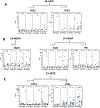Dose- and time-dependent increase in circulating anti-inflammatory and pro-resolving lipid mediators following eicosapentaenoic acid supplementation in patients with major depressive disorder and chronic inflammation
- PMID: 33316626
- PMCID: PMC7855824
- DOI: 10.1016/j.plefa.2020.102219
Dose- and time-dependent increase in circulating anti-inflammatory and pro-resolving lipid mediators following eicosapentaenoic acid supplementation in patients with major depressive disorder and chronic inflammation
Abstract
Background: Eicosapentaenoic acid (EPA) supplementation is an effective treatment option in major depressive disorder (MDD) associated with chronic low-grade inflammation. EPA is the precursor of specialized pro-resolving lipid mediators (SPMs) termed resolvins (Rv), that serve important roles in the resolution of inflammation. The objective of this study was to assess the effects of different doses of EPA on plasma concentrations of EPA metabolites and SPMs in MDD patients.
Methods: In a 2-site study, 61 MDD patients with body mass index >25 kg/m2 and serum high-sensitivity C-reactive protein ≥3 μg/mL were enrolled in a 12-week randomized trial comparing EPA 1, 2, and 4 g/d to placebo. Plasma EPA (mol%) and SPMs (pg/mL) were measured in 42 study completers at baseline and at the end of treatment by liquid chromatography/mass spectrometry.
Results: Plasma EPA and SPM concentrations did not change in the placebo group during 12 weeks of treatment. Plasma EPA and EPA-derived metabolites increased significantly and dose-dependently in all EPA supplementation arms. The increase in 18-hydroxyeicosapentaenoic acid (18-HEPE), the precursor of RvE1-3, was significantly greater with the 4 g/d EPA dose than the other doses from week 4 to 12. RvE1 was undetected in all treatment groups, while RvE2 was detected in half of the subjects both at baseline and after treatment, with dose-dependent increases. RvE3 was detected only after supplementation, dose-dependently. A significant reduction in plasma arachidonic acid (AA), relative to baseline, was observed in all EPA arms. This was in contrast with an increase in AA-derived SPM lipoxin B4 (LXB4) in the 4 g/d arm.
Conclusions: Our results show a robust effect of EPA 4 g/d supplementation in increasing plasma EPA and 18-HEPE levels, associated with improved conversion to RvE2-3, and LXB4 levels.
Keywords: Eicosapentaenoic acid (EPA); Omega-3 fatty acids; Pro-resolving lipid mediators (SPM); major depressive disorder (MDD).
Copyright © 2020 Elsevier Ltd. All rights reserved.
Conflict of interest statement
Conflict of interest: Lamon-Fava S., So J, Rapaport MH, Kinkaid B, Shettler P and Maddipati KR report no conflict of interest. Mischoulon D has received research support from Nordic Naturals, consulted for Pharmavite LLC and Gnosis USA, Inc. Ziegler, TR is receiving research funding from Takeda. Dunlop B has received research support from Acadia, Compass, Aptinyx, Sage, and Takeda, and has served as a consultant to Greenwich Biosciences, Myriad Neuroscience, Otsuka, and Sophren Therapeutics. Felger J has received consulting fees from Otsuka. Fava M has consulted for Axsome, Benckiser Pharmaceuticals, Inc., BioClinica, Inc, Biogen, BioHaven, Cambridge Science Corporation, Cerecor, Gate Neurosciences, Inc., GenOmind, LLC, Gentelon, LLC, Happify, Johnson & Johnson, Lundbeck Inc., Marinus Pharmaceuticals, Methylation Sciences, Inc., Millennium Pharmaceutics, Inc. Minerva Neurosciences, Neuralstem, NeuroRX Inc., Novartis, Otsuka, Pfizer, Premiere Research International, Relmada Therapeutics Inc., Reckitt, Shenox Pharmaceuticals, Stanley Medical Research Institute (SMRI), Taisho, Takeda, Vistagen, National Institute of Drug Abuse (NIDA); National Institutes of Health (NIH), National Institute of Mental Health (NIMH), and PCORI.
Figures





References
-
- Ross R Atherosclerosis--an inflammatory disease. The New England journal of medicine. 1999;340:115–26. - PubMed
-
- Libby P, Okamoto Y, Rocha VZ and Folco E. Inflammation in atherosclerosis: transition from theory to practice. Circulation journal: official journal of the Japanese Circulation Society. 2010;74:213–20. - PubMed
-
- Kohler CA, Freitas TH, Maes M, de Andrade NQ, Liu CS, Fernandes BS, Stubbs B, Solmi M, Veronese N, Herrmann N, Raison CL, Miller BJ, Lanctot KL and Carvalho AF. Peripheral cytokine and chemokine alterations in depression: a meta-analysis of 82 studies. Acta Psychiatr Scand. 2017;135:373–387. - PubMed
-
- Serhan CN and Savill J. Resolution of inflammation: the beginning programs the end. Nature immunology. 2005;6:1191–7. - PubMed
Publication types
MeSH terms
Substances
Grants and funding
LinkOut - more resources
Full Text Sources
Other Literature Sources
Research Materials

